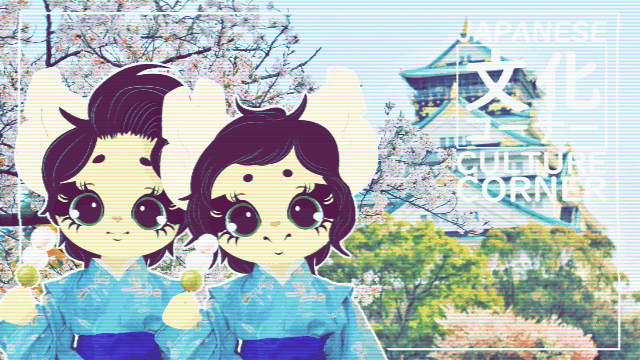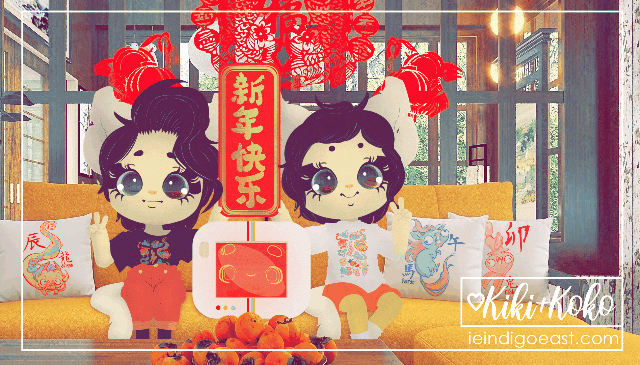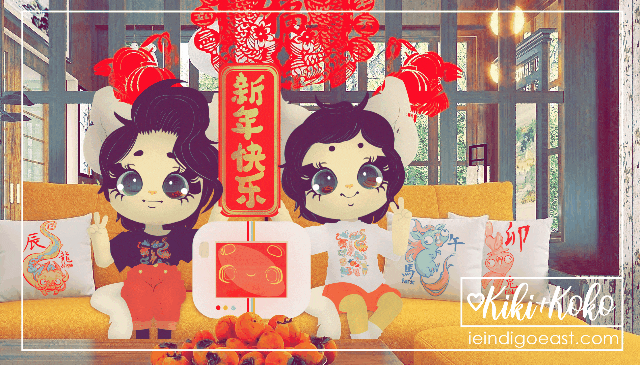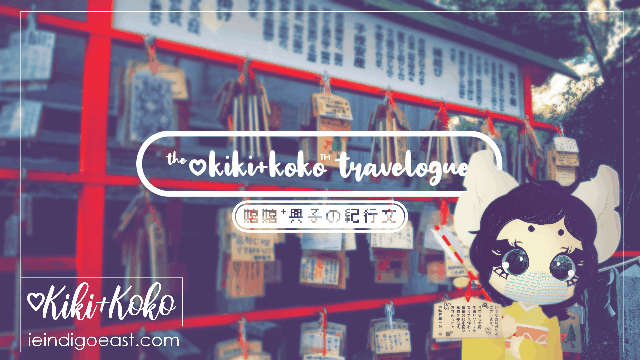 HELLO! I AM QUIZBO™!I am your assistant in Japanese Language and culture alongside your guides, my friends, Kiki+Koko! I welcome you to a corner called: Japanese Word of the Week Wednesday which is presented via Kiki+Koko: Let’s NihonGO!! at ieindigoeast.com. This time together in the middle of the week is not only meant to teach you something new, but it is meant to inspire review/revision. Repetition is the key to familiarising yourself with new concepts! But, that means you should be sure to make studying time an enjoyable and relaxing time.
HELLO! I AM QUIZBO™!I am your assistant in Japanese Language and culture alongside your guides, my friends, Kiki+Koko! I welcome you to a corner called: Japanese Word of the Week Wednesday which is presented via Kiki+Koko: Let’s NihonGO!! at ieindigoeast.com. This time together in the middle of the week is not only meant to teach you something new, but it is meant to inspire review/revision. Repetition is the key to familiarising yourself with new concepts! But, that means you should be sure to make studying time an enjoyable and relaxing time.

If you would like to learn how to apply these words to your own basic sentences, feel free to take a look at a few of Kiki and Koko’s articles on this subject in Kiki+Koko: Let’s NihonGO!! Japanese Language Essentials.
I will begin by providing a new vocabulary word or phrase which I will read aloud for you. I will repeat it as many times as you wish! That is what I am here for. I also encourage that you repeat after me. Though, if you are on a train or in a quiet area, you can always save that for later study times.
After, I will provide a few example sentences, along with Kiki+Koko’s assistance, in order to show how the word is used in different scenarios. I will also read this aloud, but it is usually at regular speed, and is usually very specific, so you need not repeat if it is too fast. You can create your own sentences with Kiki+Koko: Let’s NihonGO!! Japanese Language Essentials. This will give you the tools you need to form basic sentences with the given vocabulary.
This corner is for any learning level, as well. This will assist you in learning more about sentence structures, grammar, and expand your vocabulary. Many words that you may hear often may be considered an advanced learning level, so it is a lot more efficient to cater to all skill levels.
We will also be joined again by Kiki and Koko with a Quick Culture Corner and an explanation of the Word(s) of the Week.
Without further ado, let us NihonGO!!
Word(s) of the Week:
季節の移り変わり【きせつのうつりかわり】※
kisetsu no utsuri kawari
expression
1. turn of the seasons; change of the season; the transition from one season to the next
We’ll be right back with a Quick Culture Corner, example sentences, bonus vocabulary, and more after these messages!
Now back to your regularly scheduled programming!
※Quick Culture Corner with Kiki+Koko
+Quick Expression Examination
Photo via @kikikokoNihonGO on Twitter
Hello, there!
We’re Kiki and Koko from Kiki+Koko: Let’s NihonGO!! And, we’re here to give you a Quick Culture Corner that arose when thinking about the previous concept. Of course, covering something as broad as the change of the seasons would bring about too much to talk about all four seasons. However, we’re going to bring up an important culture point that seems to come up during every season. But, firstly: 季節の移り変わり, kisetsu no utsuri kawari, is a bit much to wade through, so we’ll help you suss out this Japanese expression bit by bit, as this should assist you when you come across other expressions in future.
季節, kisetsu, means season or time of year. And, 移り, utsuri, and 変わり, kawari, come together as one term on their own meaning change, as in the seasons, but 移り, utsuri, alone means change or transition as 変わり, kawari, also means change. However, 移り, utsuri, comes from 移る, utsuru, which means many things, but in this case it refers to elapse. So, together, they make 移り変わり, utsuri kawari, wherein the passage of time is alluded to as well as change, as in a transitional change. Though, of course, there are many times where words or phrases might not make complete sense, this at least has a bit that you can cling to.
In Japanese culture, you may have noticed a trend based on our previous articles discussing different seasonal holidays that there is a lot of focus on appreciation for the specific natural occurrences of that particular 季節, kisetsu, season. We’ve already postulated on what seems to be well known in philosophy, but we figured it deserved its own spotlight due to this.


If you’d like to read more about the concepts below, take a look at our articles on Hanami and Tsukimi by tapping or clicking on either of the thumbnails.
The changing of the seasons always seems to remind many of 無常, mujou, or impermanence. With the blooming of sakura, fading after a short time, the phases of the moon, the leaves changing their colour and falling away, it reminds us that everything is impermanent and should be enjoyed during its time. But, we can take solace in the hope of Spring’s return, when the cycle will begin again, and everything will be in bloom. Everything may not be the same as it was before, but it just gives something rarer and more special to appreciate.
We hope that helps!! Until the next lesson!
♡Kiki+Koko
Thank you, Kiki and Koko! Your cultural insight was very helpful, and I hope that this is an opportunity for people to take a look at the full article. These facets of Earthling culture are fascinating to me, as even those who are inhabit robot computers face the same concept of entropy. At any rate, this will be an interesting Bonus Word of the Week. Now, it is time to hear the pronunciation, then continue to the sentence examples.
Bonus Word(s) of the Week:
無常【むじょう】
mujou
noun, na adjective, no adjective
1. impermanence; transiency; uncertainty
Example Sentences:
The first row is in Japanese with Kanji. The Next row is in hiragana, then romanised using rōmaji with the final row translated into English.
(Japanese→Hiragana→Rōmaji→English)
Example #1:
[polite speech]
季節の移り変わりは 物質界の 無常を 感じさせます。
きせつの うつりかわりは ぶっしつかいの むじょうを かんじさせます。
kisetsu no utsuri kawari wa busshitsukai no mujou wo kanjisasemasu.
The change of the seasons makes me feel the impermanence of the material world.
Example #2:
[emphatic casual speech]
季節の移り変わりを 待った後、やっとパンプキンスパイスの レシピを 全部使えるぞ!!
きせつの うつりかわりを まったあと、 やっとぱんぷきんすぱいすの れしぴを ぜんぶつかえるぞ!!
kisetsu no utsuri kawari wo matta ato, yatto panpukin supaisu no reshipi wo zenbu tsukaeru zo!!
After waiting for the change of the season, I can finally use ALL of the pumpkin spice recipes!!
Example #3:
[polite speech]
皆様! 季節の移り変わりに 対応して、毎日セーターを 着るつもりです。以上です。
みんなさま!きせつの うつりかわりに たいおうして、まいにちせーたーをきるつもりです。いじょうです。
minnasama! kisetsu no utsuri kawari ni taioushite, mainichi seetaa wo kiru tsumori desu. ijoudesu.
Everyone! In response to the change of the season, I intend to wear a jumper* everyday. That is all.
*US/JP: sweater
*UK: jumper

Grooving to the content we’re creating? You can leave a TIP in the TIP♡JAR to keep it going!
(Can’t? No worries! The content is free for everyone! We’re just glad you’re here!!!)
Be sure to subscribe to our Electronic Mailing List of Tomorrow, today, using the form at the bottom of the web page so you can be the first to see the latest from Kiki+Koko: Let’s NihonGO!!, Indigo East, and SpeRaToBo. And, remember to return back to previous articles and lessons to review/revise.
Also consider following our new page on Twitter to support the spread of this site in a friendly domination of Earth that will help more people. Or, if you are enjoying the content that we are creating, or want to spread this content to more people to be able to access it for free, you can leave a TIP in the TIP♡JAR to keep it going. If you cannot, then no need to worry. We are just super happy that you are here! It is appreciated!
Thank you so much for learning with us!
♡QUIZBO™
Categories: Kiki+KoKo: Let's NihonGO!!, SpeRaToBo, 単語 | Vocabulary!, 文化|Culture!





























2 replies »